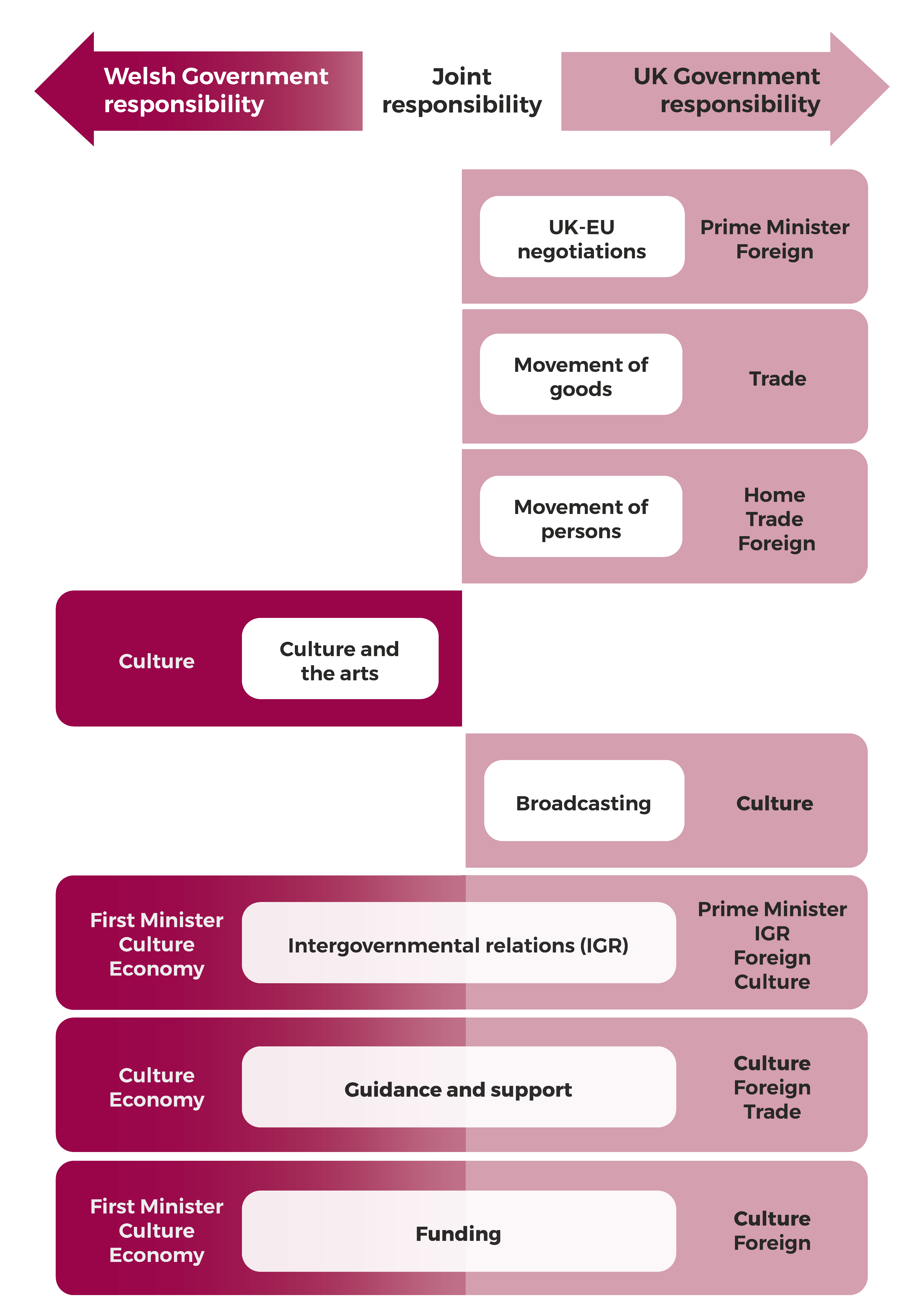On Wednesday 12 February, the Senedd will debate the Culture shock report.
It presents the first evidence of the effects of Brexit on the culture sector from the Culture, Communications, Welsh Language, Sport and International Relations Committee (“the Committee”).
Since 1 January 2021, when the UK-EU Trade and Cooperation Agreement (TCA) took effect, touring in the EU has been subject to a patchwork of complicated rules because the agreement doesn’t fully cover this scenario.
As early as February 2021, the Welsh Government published a paper on what the UK’s new relationship with the EU meant for Wales. For culture and the arts, it warned that the:
…new complexity involves significant additional resources, time and money.
The Committee’s evidence points to administrative, financial, and perceptual obstacles, which Small World Theatre likened to “a cultural Iron Curtain”. This article explains some of the issues, the Committee’s findings, and the governments’ responses.
EU exit and creative work
Different elements need to work together to facilitate cross-border creative work, including moving people (like artists and performers) and their goods (such as instruments, equipment and merchandise). The TCA only covers some elements. Find out more below:
The movement of creative workers isn’t specifically covered in the TCA and EU Member States can decide their own approaches. As a result, UK workers touring the EU must navigate 27 different sets of rules. Additionally, non-EU nationals can only spend up to 90 days in any 180-day period under Schengen-area rules.
Some requirements for moving goods are that:
- Taking goods temporarily into the EU can require a goods passport, an ATA carnet (“carnets”). This usually costs £200-500 plus a security deposit based on the goods’ value. NoFit State told the Committee theirs costs around £28,000;
- Different rules and requirements apply to merchandise depending on its value, weight and where it’s sold. A solo artist said this was “most affected” by the new rules; and
- Cabotage transport rules limit the number of tour stops to three in every seven days before you must return to the UK. UK Music said this takes “huge time and financial cost”.
The Committee heard about a lack of comprehensive, reliable information and how artists often need to consult multiple sources. It said:
It is clear to us that the time, effort and resource expended to find reliable, clear and accurate information is disproportionate and has a detrimental impact.
The Committee called on the government to explain what guidance and support it provides on cross-border working post-Brexit and to confirm if it funds third party advice services. However, limited detail is provided in response.
Brexit meant that the UK left the EU’s funding programmes and networks, including Creative Europe, whose budget has since increased by 66% to €2.44 billion for 2020-2027. Whilst the TCA provides for UK participation in EU programmes, Creative Europe isn’t currently included. Jones the Dance told the Committee the loss has been “devastating” and its work will likely cease.
At the Committee’s request, the Welsh Government outlined how it’s mitigated the effects of Brexit on the sector in its response, including introducing financial support schemes and initiatives to foster resilience and innovation. However, it concedes these aren’t dedicated to addressing Brexit issues.
A proposed solution to some of these issues was put forward in December 2023 by the joint UK-EU parliament, the Parliamentary Partnership Assembly (PPA). The Committee supports the proposal and, in its response to the report, the Welsh Government “fully supports” it, too.
The Welsh Government also responded positively to the Committee’s call for this issue to be prioritised in the upcoming implementation review of the TCA. Four Senedd committees are currently considering evidence on this.
Responsibilities and decision-making
Multiple UK and Welsh government departments and ministers have responsibilities in this area, as shown on our infographic below.
Responsibilities of the UK and Welsh governments

The Cabinet Secretary for Economy, Energy and Planning, Rebecca Evans MS, responded on the Welsh Government’s behalf to the Committee’s report. She is responsible for trade and coordinating the TCA across government.
On working with the UK’s other governments, the Welsh Government partially accepted the Committee’s call for it to champion this issue at meetings but resisted the call to report back once a term on how it’s done this. The Committee said the post-Brexit intergovernmental system “appears to have failed the sector”, with no record of these issues in formal documents at the time of the report’s publication.
Data and evidence
The Committee found:
What is lacking is Wales-level data that captures the full scale of the impact which we believe the Welsh Government is singularly and best placed to obtain.
It was “troubled” by testimony that the Welsh Government hasn’t engaged with the sector to gather evidence of Brexit impacts and asked it to confirm what data it’s using to inform decisions.
In response, the Welsh Government confirmed that it hasn’t carried out an assessment of Brexit’s impact and that it relies on Wales Arts International for “the majority” of its data and evidence.
Has the Culture shock report moved the needle?
While touring artists are a UK priority for both the upcoming TCA implementation review and the UK-EU reset, references to date are to the movement of persons only. Details on the other elements described in this article have not been forthcoming.
The UK Government’s Minister for Creative Industries, Arts and Tourism, Sir Chris Bryant MP, outlined his ambition to make things easier for the sector in his response to the report. He describes work underway with stakeholders, the EU and EU Member States to improve the situation.
Wednesday’s debate is the next step in understanding how the Welsh Government is responding. It rejected other key recommendations in the report, including to:
- establish a new advisory group on UK-EU relations featuring culture sector representatives;
- include the issue as a priority in a strategy setting out its ambition for UK-EU and Wales-EU relations; and to
- provide its assessment of Brexit’s impact on the sector.
It accepted the call to incorporate the report’s findings into future culture and international strategies but only where they align to its own priorities.
Culture shock paints a bleak picture for the sector of lost opportunities, reduced activity, increased costs and lost income. In it, the Committee pledges to champion this work in Wales and to maintain pressure on both governments to find a solution.
Article by Sara Moran, Senedd Research, Welsh Parliament






